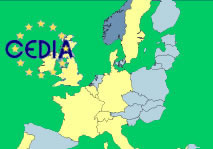| |
EUROPEAN
CONFEDERATION OF AGRONOMISTS ASSOCIATIONS
Presentation Given February 23rd 2006, Armagh
Alberto Krohn
What
is CEDIA?
An organisation that represents the European Associations
of Agronomists.
The Germans, French and Italians Agronomists working
in Brussels, created the first CEDIA in 1987. Under the name: European
Committee of Agronomists
In Copenhagen
in 1996 the name was changed to the present one:
European Confederation Of Agronomists Associations
We, for the
moment, represent 11 countries:
- Belgium
- Cyprus
- Denmark
- France
- Greece
- Germany
- Ireland
- Italy
- Portugal
- Switzerland
- Sweden
What
does CEDIA do?
- Annual Conference
on an important theme, such as:
- Environment
- The CAP
Reform
- The World
market
- The use
of GMO
- Safe
Food Production
- Landscape
Management and
- The Bologna
process.
- European
Employment Network (that we are working on)
- Several
“Green lunches” were organised in Brussels (eventually
to do again)
- We publish
a Newsletter (3 per year)
- We have
an internet site: www.cedia.be
- One can order
the Newsletter at the main page of our site, just by entering
his or her email address.
Agronomists
in the European Countries
There are very
few figures on the professional situation of the Agronomist in most
of the Countries.
But we managed
to obtain the following:
Switzerland
(2002)
- 2000 Agronomists,
and
- 200 Food
Engineers
- 1/3 is retired,
1/3 is under 65 and another 1/3 is under 45
- 76% were
working in agro-education and extension services
- 50/50 Public
/Private sectors


Denmark
(2003)
- 3332 Agronomists
(and related sciences)
- 47% working
in Public Administration (local and/or regional levels)
- 53% Private
or abroad
- 26%
Private companies
- 25% Farmers
advisers services
- 2% Abroad

France
(2005) (INA-PG)
- 18600 Agronomists
- 60% Private
companies
- 40% Public
sector

Private
(France)
- 27% Industries
- 56% Services
- 11% Agriculture
(or “Agro-organisations”)
- 6% Self-employment

Public
(France)
- 46% Public
Administration
- 34% Research
- 20% Teaching

Portugal
(2005)
- We are around
3000 engineers
- Private
sector: 47%
- Public sector:
53%



This is (or
was) the situation in a few countries:
Now, let’s
talk about the future
Fact
1
- The END of
the CAP as we knew it for severeal decades (to produce was the
target...... no matter at what cost!)
- Meaning
the end of certain way of thinking the agricultural economy (read
”produce”) (who can forget the ”mountains”
of meat, butter or cereals and the ”rivers” of milk?)
Fact
2
- At that
time, a ”good” technician was the one that provided
the ”good way to get more subsidies” and increased
the production.
- (One must
not forget that at that time the agricultural prices were too
high, leading the consumption prices to even higher level, and
a complete “miss link” to the World market!)
Fact
3
- So, we can
say that production in itself is not anymore the goal….
- In my point
of view the new goals are (not necessarily in this order) :
- Welfare
of people
- Protection
of the environment (we must give to the next generation a
world in the same or better condition!...)
- Sustainability
of production,
- Others.
Fact
4
- This means
that the traditional jobs (those we knew and probably took for
granted!) are also over!
- So, we must
come up with solutions for, not only the youngsters (ending college
now) but also for ourselves!
Which
jobs will be available?
- Management
positions:
- In advisory
services
- Public
sector
- Private
sector
- Research
- Biotechnology
- Communication
- International
jobs
Requested
skills in future
- Ability to
analyze and solve problems at a scientific level
- Flexibility
in job market (the wider the better)
- Ability to
cooperate with persons holding other master educations
- Ability to
communicate (comunicate is today as important as to know...)
- And, last
but not least, INNOVATION
Conclusion
The main issues
are:
To be
able:
- to INNOVATE
- to have the
skills to do almost everything
Life Long Learning
is part of the solution
Thank you very
much to all for your patience and attention.
And, to our
colleagues and friends from Northern Ireland, I hope that this presentation
will bring you to think about joining CEDIA…
Thanks again
Alberto Krohn
|











